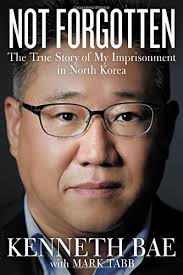I often find that Christian biographies are most encouraging. Seeing how believers think and respond to the circumstances of life has often been thought-provoking. So when I came across “Not Forgotten” in my local Christian bookstore I was excited. So few outsiders have been inside North Korea and been able to tell their story later.
I would love to recommend this book. However, I think it has some fatal flaws.
Let’s start with the positives. I did learn a great deal about North Korea. Seeing the incredibly difficult circumstances of the people of North Korea through Kenneth Bae’s eyes was enlightening. It is hard to imagine living life as they do being completely sheltered from the outside world. Reading of thousands of ordinary people racing out to shovel snow from the main road to allow government officials to drive on it was the kind of thing I could not have imagined. So I am grateful for an insight into the lifestyle and thinking of the North Korean people the author met.
However, the book did disappoint me as a Christian. There is no doubt that Kenneth Bae is a Christian and his intentions are good, but his theology ends up being less than Biblical and therefore less helpful than it could be in times of crisis.
Issue #1 How we know God loves us
Being detained with extremely difficult situations and much uncertainty about the future must be terrifying. Anyone in that situation would need some comfort. So where does Kenneth turn when times get tough? To an experience that he had early in his detention when his “left hand started getting warm. Standing absolutely still, I slowly opened my hand. I saw something sparkling like gold dust. Then, the warmth spread from my hand and up my left arm.” (p29) He heard God speak to him and assure him that all would be OK and the Spirit was holding his hand.
I don’t doubt that Kenneth had this experience. But it seems a flimsy thing to base your assurance on a warm feeling in your arm.
How does the Bible encourage us to know God loves us? By looking to the cross, where Jesus demonstrated his love for us (Rom 5:8). By the historical evidence that Jesus is risen from the dead (1 Cor 15). If we place our trust in difficult times in our own experiences we are separating our hope from the core of the gospel. God might give us some special assurance or sign, but there is no promise that He will.
Issue #2 Seeing the world as a mission field
The author spent his life as a missionary prior to being detained in North Korea, so I expected some missionary intent in him immediately upon his arrest. But for a long time all his prayers were only for release and rescue, and he interpreted a range of Bible passages in this way (including Ps 91:14-15, p87). Only after a later inspiration, and a delay in his release, did he realize his unique position to witness to his captors.
Paul is an interesting contrast here. He was detained with an uncertain future numerous times, writing a few letters from jail. Yet he doesn’t pray for release but for opportunities for the gospel. He uses every opportunity to spread the gospel.
I am grateful for Kenneth Bae’s heart for North Korea. But I fear his example might not be a great one for Christians in tough places. We have greater confidence than a warm feeling or a subjective feeling; we have Jesus who died for us in our place. A much more solid foundation, and one that can bring great comfort when times are tough. We shouldn’t look to more special revelation to encourage and comfort us but we should take heart in the fact that Jesus is the King of all.
North Korea needs our prayers and whatever mission efforts that can be arranged. But that mission needs to be informed by the Bible and be focused on Jesus, for that is where God’s plan is focused (Col 1).

